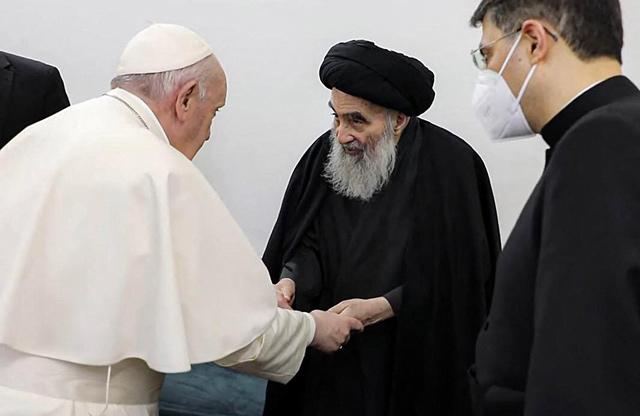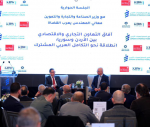You are here
Pope says meeting Shiite cleric 'good for my soul'
By AFP - Mar 09,2021 - Last updated at Mar 09,2021

This handout photo released by Ayatollah Sistani's media office shows Iraq's most revered Shiite cleric, Grand Ayatollah Ali Al Sistani (centre) meeting with Pope Francis and his delegation, at his home in the holy city of Najaf, on Saturday (AFP photo)
ABOARD THE PAPAL PLANE — Pope Francis said on Monday his meeting with top cleric Grand Ayatollah Ali Sistani had been "good for my soul", as he returned to Rome following his historic trip to Iraq.
Speaking in an in-flight press conference, the 84-year-old Pontiff admitted the packed three-day visit had been more tiring than previous trips.
But he defended making the journey despite concerns about coronavirus and security, saying he took the decision "conscious of the risks".
In his first trip since COVID-19 swept across the world last year, and the first ever by a Pope to Iraq, Francis both brought encouragement to the country's diminished Christian community and extended a hand to Shiite Muslims.
He spoke warmly of his meeting on Saturday with Sistani, 90, who is extremely reclusive and rarely grants meetings but made an exception to host Francis.
"I felt the need to make this pilgrimage of faith and penitence and to go and find a great, wise man, a man of God — you could tell that just by listening to him," Francis said.
"That meeting was good for my soul."
The face-to-face meeting marked a landmark moment in modern religious history and for Francis's efforts to deepen interfaith dialogue.
On the plane, the Pontiff noted criticism of his approach by some Catholic traditionalists, suggesting some saw him as "one step away from heresy".
"These are risks. These decisions are always taken in prayer, in dialogue, by asking for advice. It's a reflection, not a whim," he said.
'Conscious of risks'
Francis arrived in Iraq just as the country was hit by a new surge in COVID-19 infections, and his visit led crowds to assemble in several churches and a stadium.
Asked about the potential danger to Iraqis posed by his visit, the Pope said he took the decision to go "conscious of the risks".
"I thought about it a lot, I prayed a lot over it. And in the end, I made the decision, freely, with an inner call," he said.
But he added: "I have to confess to you that during this trip I felt a lot more tired than during other ones."
Over the past two months, the pope had to cancel some events because of sciatica — nerve pain that means he often walks with a slight limp.
After several early morning starts and domestic flights, the Pontiff appeared to have more trouble walking than usual.
But he said on Monday that he did not know whether his papal voyages would slow down. He said he would go to Budapest in September and mentioned possible trips to Slovakia and Lebanon.
As for Lebanon, engulfed in a triple economic, health and political crisis, Francis said he wanted to go as soon as possible to a country that was "suffering".
The Pope confirmed the revelation in a recent book that he expects to die in Rome, not his native Argentina, saying: "I lived for 76 years in Argentina, that's enough."
Related Articles
UR, Iraq — Grand Ayatollah Ali Sistani, one of Shiite Islam's top clerics, told Pope Francis in a historic meeting in Iraq on Saturday that
VATICAN CITY — Pope Francis expressed solidarity on Sunday with the victims of the novel coronavirus in his first livestreamed prayer from t
HOLGUIN, Cuba — On a special anniversary for him, Pope Francis celebrated mass in east Cuba on Monday on the last full day of a trip where h

















